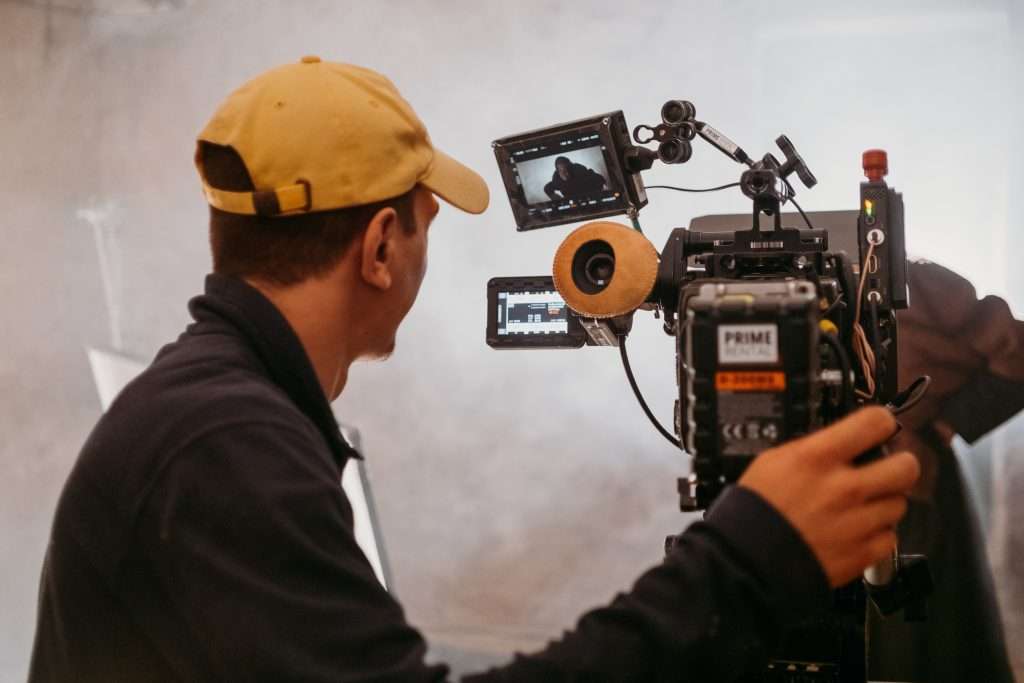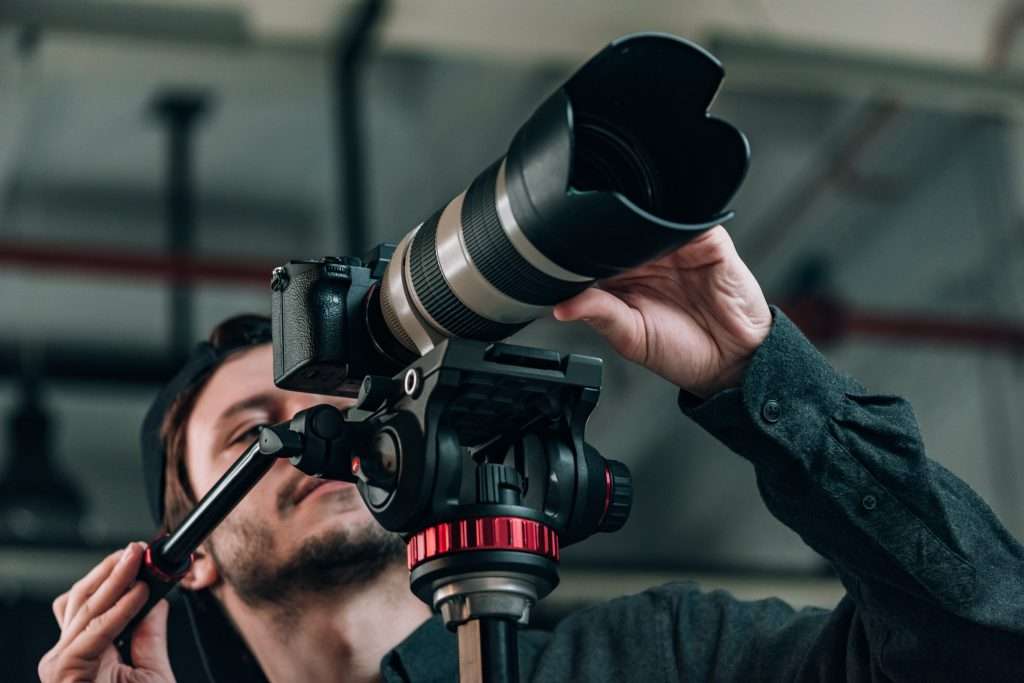Venturing into the world of film production can be a bit of a pickle, particularly when attempting to comprehend roles such as cinematographers and cameramen. It’s plain sailing to blur those two designations together – after all, they are both in charge of cameras on set.
However, would you believe that these positions carry vastly different workload during a shoot? This article is here to offer you insight by distinctly delineating between these crucial roles in filmmaking, illuminating their unique tasks with clarity.
Carry on reading to peel back the layers and discover what truly separates a cinematographer from a cameraman!
Key Takeaways
- A cinematographer is responsible for creating the overall look and feel of a film’s visuals, including camera placement, lighting, and composition.
- A cameraman focuses on capturing footage in real – time and operates the camera during filming.
- The cinematographer collaborates closely with the director to bring their vision to life, while the cameraman works directly with the camera following instructions from the cinematographer or director.
- While both contribute to the visual storytelling process and the overall look and feel of a film, their roles differ in terms of artistic and technical aspects versus real-time capture.
Roles and Responsibilities of a Cinematographer

The cinematographer is responsible for creating the overall look and feel of a film’s visuals, including camera placement, lighting, and composition.
Overall look and feel of the film’s visuals
The overall look and feel of a film’s visuals is a big job. The cinematographer makes it happen. They work with the director to decide how the movie should look. This may include things like where to place the camera, or what kind of lights to use.
They also think about how the picture will be set up or “composed”. All these choices help create the mood of the film, whether it’s happy, sad, scary or exciting! This is an important part in telling the story on screen.
Camera placement, lighting, and composition
We, as cinematographers, see these three aspects as building blocks of a film’s visuals:
- Camera Placement: We choose where to put the camera. The place we pick gives a feel to the scene. It also shows the viewer what is most important in the scene. This role falls to us.
- Lighting: We set up lights for every shot. Light can change how a scene looks and feels. It can make an actor look happy, sad or scared. Our job means making sure the light tells the story.
- Composition: The way things are placed in front of a camera is very important. Where people and things are changes how viewers feel about a scene. As cinematographers, we help decide what goes where.
Collaboration with the director
A cinematographer’s job involves a lot of talks with the director. They have to work closely to make sure the film looks just right. The director has an idea for what they want their movie to look like.
The cinematographer makes this happen using lights, cameras, and other tools. They need to know each small detail about the story and shots that will help them meet the director’s goal.
It is not an easy task but it leads us to see a good film in the end!
Roles and Responsibilities of a Cameraman

A cameraman is responsible for capturing moments on the fly, operating the camera during filming, and rehearsing shots while setting up equipment.
Capturing moments on the fly
A cameraman is always ready to catch moments as they happen. This means shooting things that go on in real time. They are good at using the camera during filming. Their job is also to set up the camera and make it work right before we start to film.
Shooting fast, but still getting shots that look nice, is a big part of their job.
Operating the camera during filming
We turn the camera on during filming. The cameraman does this job. They set up shots and fix settings. Smooth operation of the camera is their task in production. They make sure everything goes right while filming.
This lets us get what we want to show in our film or project. They do not make big choices, but they follow orders well from the cinematographer or director.
The cameraman keeps shooting live events like news broadcasting too! Not just films, all areas need them to capture real-time footage for us all to see later! Operating a camera takes skill and quick reflexes which are very important jobs on a film set and in video production!
Rehearsing shots and setting up equipment
A key job for a cameraman is rehearsing shots and setting up equipment. Here are some of the tasks involved:
- The cameraman tests out camera angles.
- They plan their movements ahead of time.
- The team helps to set up all the gear.
- Lights, mics, and cameras have to be in the right place.
- The cameraman checks all settings on the camera.
- They make sure everything is ready before filming starts.
- After each shot, they check if everything went well.
- If not, they work out the problems and start again.
Differences Between a Cinematographer and a Cameraman
While both play crucial roles in the filmmaking process, cinematographers focus on the artistic and technical aspects of creating visually stunning films, while cameramen are responsible for capturing footage in real-time.
Read on to learn more about their unique responsibilities and contributions to the world of cinema.
Cinematographer focuses on artistic and technical aspects
A cinematographer takes control of both art and technology in filmmaking. They make the film look a certain way using their skills. They use lighting and camera positioning to do this job well.
The director works closely with them to bring what’s in their mind to life on screen. Their goal is to tell the story using visuals that capture people’s attention. They have a strong say in how the film should feel and look, making sure it goes hand in hand with what the director wants.
Their role is very important as they shape how we see and experience films.
Cameraman focuses on capturing footage in real-time
The cameraman’s main focus is capturing footage in real-time. They are responsible for operating the camera during filming and making sure they capture the desired shots. The cameraman sets up equipment, rehearses shots, and adjusts camera settings to ensure everything runs smoothly while filming.
They work closely with the cinematographer or director, following their instructions to get the right shots. Whether it’s for a film, news broadcast, or live event, the cameraman’s job is to capture all the action as it happens in real-time without missing any important moments.
Cinematographer collaborates with the director
The cinematographer works closely with the director to bring their vision to life. They collaborate on determining camera placement, lighting, composition, and the overall visual aesthetic of the project.
The cinematographer’s role is to understand and translate the director’s creative vision into tangible visuals on screen. They work together to ensure that each shot captures the desired emotion and storytelling elements.
This collaboration is crucial in creating a cohesive and visually stunning film.
Cameraman works directly with the camera
The cameraman, also known as the camera operator, has a crucial role in the filmmaking process. They work directly with the camera during filming, operating it to capture the desired shots.
The cameraman sets up shots, adjusts camera settings, and ensures that everything runs smoothly with the camera during production. They take direction from the cinematographer or director to capture specific moments on film.
Their main focus is on handling all aspects related to the camera itself, ensuring that it is in proper working order and capturing footage according to instructions.
Understanding the Difference Between a Cameraman and a Videographer
A cameraman and a videographer have different roles in the film-making process. A cameraman focuses on capturing real-time footage, like in news broadcasting or live events. They operate the camera, set up shots, and follow instructions from the cinematographer or director.
On the other hand, a videographer is responsible for filming and editing videos for various purposes, like weddings or corporate events. They have more creative control over their work and often handle all aspects of video production themselves.
While both are involved in creating visual content, their responsibilities and level of involvement differ based on the context of their work.
Similarities Between a Cinematographer and a Cameraman
Both the cinematographer and cameraman play vital roles in the visual storytelling process, contributing to the overall look and feel of the film. Discover more about their similarities in our blog post!
Both involved in the visual storytelling process
Both the cinematographer and the cameraman play important roles in the visual storytelling process. They work together to bring a film or project to life visually. The cinematographer focuses on shaping the overall look and feel of the visuals, collaborating closely with the director to determine camera angles, lighting, composition, and other creative elements.
The cameraman, also known as a camera operator, works directly with the camera during filming, ensuring that shots are executed smoothly according to the vision of the cinematographer and director.
Both professionals contribute their expertise to create engaging visual narratives that enhance the story being told on screen.
Both contribute to the overall look and feel of the film
Both the cinematographer and cameraman play a vital role in creating the overall look and feel of a film. The cinematographer focuses on the artistic and technical aspects of the visuals, working closely with the director to determine camera placement, lighting, composition, and the visual aesthetic.
On the other hand, the cameraman or camera operator works directly with the camera during filming, setting up shots and ensuring smooth operation. Together, they collaborate to bring the director’s vision to life and create a cohesive visual narrative for the film.
Conclusion
In conclusion, while both a cinematographer and a cameraman play important roles in capturing visuals for film or projects, there are key differences between the two. A cinematographer focuses on the artistic and technical aspects, collaborating with the director to create the overall look and feel of the project.
On the other hand, a cameraman is more focused on operating the camera and capturing footage in real-time. Understanding these distinctions helps to appreciate their unique contributions to the visual storytelling process.
Is a Videographer the Same as a Cameraman?
When it comes to capturing visual content, understanding the difference between cameraman and videographer is crucial. While they share some similarities, there are distinct variations in their roles. A cameraman primarily focuses on operating the camera, framing shots, and ensuring technical aspects, whereas a videographer encompasses a broader scope of responsibilities, including planning, shooting, and editing video content. So, while closely related, there are key distinctions between a cameraman and a videographer.
FAQs
1. What is a cinematographer?
A cinematographer is a person who works with the director to create the visual look of a film or TV show.
2. What does a cameraman do?
A cameraman operates the camera and captures the footage, following instructions from the director and cinematographer.
3. Is there any difference between a cinematographer and a cameraman?
Yes, while both work with cameras in filmmaking, a cinematographer is responsible for planning and executing the overall visual style, while a cameraman focuses on operating the camera itself.
4. Can someone be both a cinematographer and a cameraman?
Sometimes, especially in smaller productions or documentaries, one person may take on both roles of being both the cinematographer as well as operating the camera.
5. Are there educational requirements to become a cinematographer or cameraman?
There are no specific educational requirements to become either profession; however, formal training in film production or photography can be beneficial for developing skills and knowledge in these fields.






